| Listing 1 - 10 of 31 | << page >> |
Sort by
|
Multi
ISBN: 9780521281232 9781107010543 9780511862441 Year: 2014 Publisher: New York, N.Y. Cambridge University Press
Abstract | Keywords | Export | Availability | Bookmark
 Loading...
Loading...Choose an application
- Reference Manager
- EndNote
- RefWorks (Direct export to RefWorks)
"Literature and philosophy have long shared an interest in questions of truth, value, and form. And yet, from ancient times to the present, they have often sharply diverged, both in their approach to these questions and in their relationship to one another. Moreover, the vast differences among individual writers, historical periods, and languages pose challenges for anyone wishing to understand the relationship between them. This Introduction provides a synthetic and original guide to this vast terrain. It uncovers the deep interests that literature and philosophy share while offering a lucid account of their differences. It sheds new light on many standing debates and offers students and scholars of literary criticism, literary theory, and philosophy a chance to think freshly about questions that have preoccupied the Western tradition from its very beginnings up until the present"--
Aesthetics --- Literature --- Philosophy. --- Criticism --- Literary form --- Philosophy in literature --- Truth in literature --- Values in literature --- Belles-lettres --- Western literature (Western countries) --- World literature --- Philology --- Authors --- Authorship --- Literature and philosophy --- Philosophy and literature --- Form, Literary --- Forms, Literary --- Forms of literature --- Genre (Literature) --- Genre, Literary --- Genres, Literary --- Genres of literature --- Literary forms --- Literary genetics --- Literary genres --- Literary types (Genres) --- Evaluation of literature --- Literary criticism --- Rhetoric --- History and criticism&delete& --- Theory, etc --- Philosophy --- Theory --- Technique --- Evaluation --- History and criticism --- Literature History and criticism --- Theory, etc.
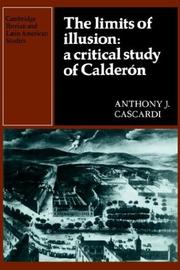
ISBN: 052126281X 0521022770 0511659415 Year: 1984 Publisher: Cambridge Cambridge University Press
Abstract | Keywords | Export | Availability | Bookmark
 Loading...
Loading...Choose an application
- Reference Manager
- EndNote
- RefWorks (Direct export to RefWorks)
This is the first thorough study of Calderón in comparison with other important dramatists of the period: Lope de Vega and Tirso de Molina in Spain, Racine and Corneille in France, and Shakespeare and Marlowe in England. Cascardi studies Calderón's paradoxical engagement with illusion in its philosophical guise as scepticism. He shows on the one hand Calderón's moral will to reject illusion and on the other his theatrical need to embrace it. Cascardi discusses plays from every period to show how in Calderón's best work illusion is not rejected; instead, scepticism is absorbed. Calderón is placed in and defined against the philosophical line of Vives, Descartes, and Spinoza. Of central importance to this argument is Calderón's idea of theatre and the various transformations of that idea. This emphasis will give the book an additional interest to students, readers in philosophy and comparative literature.
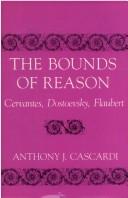
ISBN: 0231062125 Year: 1986 Publisher: New York
Abstract | Keywords | Export | Availability | Bookmark
 Loading...
Loading...Choose an application
- Reference Manager
- EndNote
- RefWorks (Direct export to RefWorks)
Comparative literature --- Fiction --- Thematology --- Cervantes Saavedra, de, Miguel --- Flaubert, Gustave --- Dostoyevsky, Fyodor M. --- -Knowledge, Theory of, in literature --- Philosophy in literature --- Skepticism in literature --- Metafiction --- Novellas (Short novels) --- Novels --- Stories --- Literature --- Novelists --- History and criticism --- Philosophy --- Cervantes Saavedra, Miguel de --- -Dostoyevsky, Fyodor --- -Flaubert, Gustave --- -Philosophy --- Knowledge, Theory of, in literature. --- Philosophy in literature. --- Skepticism in literature. --- History and criticism. --- Knowledge, Theory of, in literature --- Dostoyevsky, Fyodor, --- Flaubert, Gustave, --- Cervantes Saavedra, Miguel de, --- Cerbantes Saavedra, Miguel de, --- Cervantes de Saavedra, Miguel de, --- Cervantes, M., --- Cervantes, Michael a, --- Cervantes, Miguel de, --- Cervantes Saavedra, Michael a, --- Cervantes Saavedra, Michiel de, --- Cervantes Savedra, Miguel, --- De Cervantes Saavedra, Miguel, --- Hsi-wan-ti-shih, --- Saavedra, Miguel de Cervantes, --- Sai-wan-tʻi-ssŭ, --- Savedra, Migelʹ Servantes, --- Savedra, Miguel Cervantes, --- Servantes, M., --- Servantes Saavedra, Migelʹ de, --- Servantes Saavedra, Miguėlʹ, --- Serṿantes Saṿaidrah, Miguʼel de, --- Servantes Savedra, Migelʹ, --- Servantesu, M., --- Sirfāntīs, --- Tservantes, Michaēl, --- Сервантес Сааведра, Мигель де, --- סערװאנטעס סאאװעדרא, מיגעל דע --- סערוואנטעס דע סאאוועדרא, מיגעל דע --- סרונתס סאוידרה, מיגואל די --- סרונטס סאאוידרא, מיגואל די, --- סרונטס סודרה, מיגל דה, --- סרונטס, מיגאל --- צערװאנטעס, מיגועל, --- ثربانتس سابدرا، ميجيل دي، --- سروانتس --- セルバンテス, --- 塞万提斯, --- Достоевский, Федор, --- Dostoevskiĭ, Fedor, --- Dostoievski, Fédor Mikhailovitch, --- Dostoievski, Fiodor, --- Dostojevski, F. M., --- Dostojewskij, Fjodor M., --- Tʻo-ssu-tʻo-yeh-fu-ssu-chi, --- Tuosituoyefusiji, --- Dostoevsky, Fyodor, --- Zuboskal, --- Dostoevskiĭ, Fedor Mikhaĭlovich, --- Dostoevskiĭ, F. M. --- Dostojewski, Fjedor Michailowitsch, --- Dustūyafskī, Fīdūr, --- Dostoievsky, F., --- Dosztojevszkij, Fjodor Mihajlovics, --- Tu-ssu-tʻo-yeh-fu-ssu-chi, --- Dusituoyefusiji, --- Dostojewski, --- Dostojewski, Fiodor, --- Dostoevskij, Fedor, --- Dostojewskij, F. M. --- Dostojevskij, F. M., --- Dostojevskij, Fjodor, --- D̲ostogiephski, Ph. M., --- Dostoïevsky, Th. M., --- D̲ostogiephsky, Phiontor Michaēlovits, --- Dostoiewskij, --- Dostojewski, Fjodor, --- Dostoevsky, Fedor, --- Dostoïevsky, Fédor, --- Dostoevsky, F. M. --- Dostojevskis, F., --- Dostoevski, F., --- Dostojewsky, --- Dosṭoyevsḳi, Fyodor Mikhailovits', --- Dostogephskē, Th., --- Dostojewski, Teodor, --- Dāstavaskī, --- D̲ostogephski, --- Dostojevskis, Fjodors, --- D̲ostogievskē, Phiontor, --- Dostoyewski, Fedor, --- Dosztojevszkij, F. M. --- Dosṭoyeṿsḳi, F. M., --- Dostojevskij, Fedor Michajlovič, --- Tāstayēvski, K̲apiyōtar, --- Dostoievski, Fedor, --- Dastoyaveski, Fiyodar, --- Dosṭoyevsḳi, Fyodor, --- Dāstāyivskī, --- דאםטאיעווםקי, פ. --- דאסטאיעווסקי, פ. --- דאסטאיעווסקי, פ. מ. --- דאסטאיעווסקי, פ. מ., --- דאסטאיעוועסקי, פ. --- דאסטאיעװסקי, פ.מ --- דאסטאיעװסקי, פ., --- דוסטויבסקי --- דוסטויבסקי, פדור מיכאילוביץ --- דוסטויבסקי, פיודור מיכאילוביץ, --- דוסטויבסקי, פיודור ניכילוביץ' --- דוסטויבסקי, פיודור, --- דוסטויבסקי, פי., --- דוסטויבסקי, פ. מ., --- דוסטויבסקי, ת. ד. --- דוסטוייבסקי, פיודור --- דוסטוייבסקי, פיודור, --- 陀司妥也夫斯基, --- 陀思妥也夫斯基, --- 陀思妥耶夫斯基, --- F. ドストエフスキー, --- Philosophy. --- ドストエフスキー --- De Cervantes, Miguel, --- Cervantes y Saavedra, Miguel de --- De Cervantes, Miguel --- Cervantes, Michel --- Flaubert, Gustaw, --- Flober, Gi︠u︡stav, --- Fu-lou-pai, --- Fu, Lou-pai, --- Fu-lou-pai, Chü-ssu-tʻa fu, --- Fuloubai, --- Phlōmper, Gkystav, --- Phlōmper, Goustauos, --- Флобер, Гюстав, --- פלאבער, ג. --- פלאבער, גוסטאוו, --- פלובר, גוסטאב --- 福樓拜, --- Flūbir, Gūstāv, --- Flūbir, Gūstāw, --- فلوبر، گوستاو --- Dostoevskij, Fëdor Mihajlovič --- Dostoevskij, Fjodor Mihajlovič --- Dostoevskij, Fedor Mikhajlovich --- Dostojevski, Fjodor Michajlovitsj --- Dostojewski, Fedor --- Dostojevski, Fedor --- Dostojewski, Fjodor --- Dostojevski, Fjodor --- Dostojewski, Fjodor Michailowitsj --- Dostojewskij, Fjodor M. --- Dostoïevski, Fiodor --- Dostoïevsky, Fedor Mihajlovic
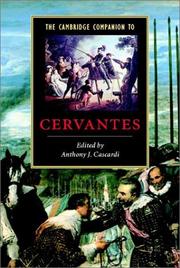
ISBN: 0521663210 0521663873 0511999682 1139816195 9780521663212 9780521663878 9780511999680 Year: 2002 Publisher: Cambridge Cambridge University Press
Abstract | Keywords | Export | Availability | Bookmark
 Loading...
Loading...Choose an application
- Reference Manager
- EndNote
- RefWorks (Direct export to RefWorks)
Don Quixote de la Mancha (1605) is one of the classic texts of Western literature and the foundation of European fiction. Yet Cervantes himself remains an enigmatic figure. The Cambridge Companion to Cervantes, first published in 2002, offers a comprehensive treatment of Cervantes' life and work, including his lesser known writing. The essays, by some of the most outstanding scholars in the field, cover the historical and political context of Cervantes' writing, his place in Renaissance culture, and the role of his masterpiece, Don Quixote, in the formation of the modern novel. They draw on contemporary critical perspectives to shed new light on Cervantes' work, including the 'Exemplary Novels', the plays and dramatic interludes, and the long romances, Galatea and Persiles. The volume provides useful supporting material for students; suggestions for further reading, a detailed chronology, a complete list of his published writings, an overview of translations and editions, and a guide to electronic resources.
Cervantes Saavedra, de, Miguel --- Cervantes Saavedra, Miguel de, --- Criticism and interpretation --- Cerbantes Saavedra, Miguel de, --- Cervantes de Saavedra, Miguel de, --- Cervantes, M., --- Cervantes, Michael a, --- Cervantes, Miguel de, --- Cervantes Saavedra, Michael a, --- Cervantes Saavedra, Michiel de, --- Cervantes Savedra, Miguel, --- De Cervantes Saavedra, Miguel, --- Hsi-wan-ti-shih, --- Saavedra, Miguel de Cervantes, --- Sai-wan-tʻi-ssŭ, --- Savedra, Migelʹ Servantes, --- Savedra, Miguel Cervantes, --- Servantes, M., --- Servantes Saavedra, Migelʹ de, --- Servantes Saavedra, Miguėlʹ, --- Serṿantes Saṿaidrah, Miguʼel de, --- Servantes Savedra, Migelʹ, --- Servantesu, M., --- Sirfāntīs, --- Tservantes, Michaēl, --- Сервантес Сааведра, Мигель де, --- סערװאנטעס סאאװעדרא, מיגעל דע --- סערוואנטעס דע סאאוועדרא, מיגעל דע --- סרונתס סאוידרה, מיגואל די --- סרונטס סאאוידרא, מיגואל די, --- סרונטס סודרה, מיגל דה, --- סרונטס, מיגאל --- צערװאנטעס, מיגועל, --- ثربانتس سابدرا، ميجيل دي، --- سروانتس --- セルバンテス, --- 塞万提斯, --- Criticism and interpretation. --- Cervantes Saavedra, Miguel de --- De Cervantes, Miguel, --- Romance Literatures --- Spanish Literature --- Languages & Literatures --- Cervantes y Saavedra, Miguel de --- De Cervantes, Miguel --- Cervantes, Michel --- Cervantes Saavedra, Miguel de, - 1547-1616 - Criticism and interpretation --- Cervantes Saavedra, Miguel de, - 1547-1616
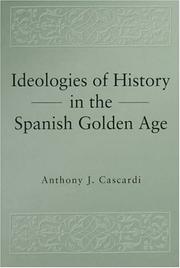
ISBN: 027101668X Year: 1997 Volume: *4 Publisher: University Park (Pa.) : Pennsylvania state university press,
Abstract | Keywords | Export | Availability | Bookmark
 Loading...
Loading...Choose an application
- Reference Manager
- EndNote
- RefWorks (Direct export to RefWorks)
Literature and society --- Spanish literature --- History and criticism. --- History and criticism --- Classical period, 1500-1700 --- Spain
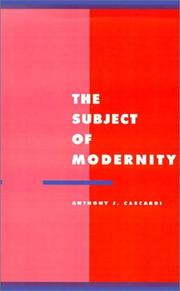
ISBN: 0521423783 0521412870 0511597428 9780511597428 9780521412872 9780521423786 Year: 1992 Volume: 3 Publisher: Cambridge Cambridge University Press
Abstract | Keywords | Export | Availability | Bookmark
 Loading...
Loading...Choose an application
- Reference Manager
- EndNote
- RefWorks (Direct export to RefWorks)
The question of modernity has provoked a vigorous debate in the work of thinkers from Hegel to Habermas. Our own self-styled postmodern age has seen no end to this debate, which now receives a major and wide-ranging intervention from the theorist and critic Anthony J. Cascardi. Offering an historical account of the origins and transformations of the rational subject or self as it is represented in Descartes, Cervantes, Pascal, Hobbes and the Don Juan myth, he carries his argument across the fields of epistemology, literature, political science, religion and psychology. The modern subject proves to be positioned within conflicting discourses, in a culture characterised by its 'detotalised totality'. Max Weber's concept of 'world disenchantment' enables Cascardi to make a searching critique of modernity's sense of its absoluteness, divorced from an archaic, 'enchanted' world. He advocates in its place a more fruitful relationship between historical analysis and theoretical speculation, offering constructive new alternatives to current orthodoxy regarding subjectivity and modernity.
Civilization, Modern. --- Literature, Modern. --- Philosophy, Modern. --- Subjectivity. --- Subjectivité --- Civilization, Modern --- Literature, Modern --- Philosophy, Modern --- Subjectivity --- Subjectivism --- Knowledge, Theory of --- Relativity --- Modern philosophy --- Modern literature --- Arts, Modern --- Modern civilization --- Modernity --- Civilization --- Renaissance --- History --- Philosophical anthropology --- Philosophie moderne --- Civilisation moderne et contemporaine --- Littérature moderne --- Arts and Humanities --- Literature
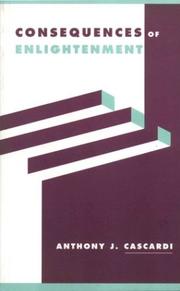
ISBN: 0521484901 052148149X 1107112648 0511116217 0511004869 051114928X 0511302959 0511483104 1280151897 0511053134 9780521484909 9780511004865 0511037899 9780511037894 9780511116216 9780521481496 9780511483103 9781107112643 9781280151897 9780511302954 9780511053139 Year: 1999 Volume: 30 Publisher: Cambridge Cambridge University Press
Abstract | Keywords | Export | Availability | Bookmark
 Loading...
Loading...Choose an application
- Reference Manager
- EndNote
- RefWorks (Direct export to RefWorks)
What is the relationship between contemporary intellectual culture and the European Enlightenment it claims to reject? In Consequences of Enlightenment, Anthony Cascardi revisits the arguments advanced in Horkheimer and Adorno's seminal work Dialectic of Enlightenment. Cascardi argues against the view that postmodern culture has rejected Enlightenment beliefs and explores instead the continuities contemporary theory shares with Kant's failed ambition to bring the project of Enlightenment to completion. He explores the link between aesthetics and politics in thinkers as diverse as Habermas, Derrida, Arendt, Nietzsche, Hegel, and Wittgenstein in order to reverse the tendency to see works of art simply in terms of the worldly practices among which they are situated.
Aesthetics --- Aesthetics, Modern --- Enlightenment. --- Political aspects. --- History of philosophy --- Philosophy and psychology of culture --- anno 1900-1999 --- anno 1700-1799 --- Enlightenment --- Esthétique --- Esthétique moderne --- Siècle des lumières --- Political aspects --- Aspect politique --- Horkheimer, Max, --- Adorno, Theodor W., --- 82.01 --- 111.85 --- 111.85 Metafysica: schoonheid; metafysische esthetica --- Metafysica: schoonheid; metafysische esthetica --- 82.01 Esthetica --- Esthetica --- Aufklärung --- Eighteenth century --- Philosophy, Modern --- Rationalism --- History --- Arts and Humanities --- Literature --- Radio broadcasting Aesthetics --- Aesthetics - Political aspects. --- Aesthetics, Modern - 20th century.
Book
ISBN: 1442696761 9781442696761 144269677X 9781442643710 9781442612235 1442643714 1442612231 Year: 2016 Publisher: Toronto
Abstract | Keywords | Export | Availability | Bookmark
 Loading...
Loading...Choose an application
- Reference Manager
- EndNote
- RefWorks (Direct export to RefWorks)
"What is the role of literature in the formation of the state? Anthony J. Cascardi takes up this fundamental question in Cervantes, Literature, and the Discourse of Politics, a comprehensive analysis of the presence of politics in Don Quixote. Cascardi argues that when public speech is constrained, as it was in seventeenth-century Spain, politics must be addressed indirectly, including through comedy, myth, and travellers' tales. Cervantes, Literature, and the Discourse of Politics convincingly reengages the ancient roots of political theory in modern literature by situating Cervantes within a long line of political thinkers. Cascardi notably connects Cervantes' political theory to Plato's, much as the writer's literary criticism has been firmly linked to Aristotle's. He also shows how Cervantes' view of literature provided a compelling alternative to the modern, scientific politics of Machiavelli and Hobbes, highlighting the potential interplay of literature and politics in an ideal state."--Page [i].
Politics and literature --- Literature --- Literature and politics --- History --- Political aspects --- Cervantes Saavedra, Miguel de, --- Cervantes y Saavedra, Miguel de --- Cerbantes Saavedra, Miguel de, --- Cervantes de Saavedra, Miguel de, --- Cervantes, M., --- Cervantes, Michael a, --- Cervantes, Miguel de, --- Cervantes Saavedra, Michael a, --- Cervantes Saavedra, Michiel de, --- Cervantes Savedra, Miguel, --- De Cervantes, Miguel, --- De Cervantes, Miguel --- Cervantes, Michel --- Hsi-wan-ti-shih, --- Saavedra, Miguel de Cervantes, --- Sai-wan-tʻi-ssŭ, --- Savedra, Migelʹ Servantes, --- Savedra, Miguel Cervantes, --- Servantes, M., --- Servantes Saavedra, Migelʹ de, --- Servantes Saavedra, Miguėlʹ, --- Serṿantes Saṿaidrah, Miguʼel de, --- Servantes Savedra, Migelʹ, --- Servantesu, M., --- Sirfāntīs, --- Tservantes, Michaēl, --- Сервантес Сааведра, Мигель де, --- סערװאנטעס סאאװעדרא, מיגעל דע --- סערוואנטעס דע סאאוועדרא, מיגעל דע --- סרונתס סאוידרה, מיגואל די --- סרונטס סאאוידרא, מיגואל די, --- סרונטס סודרה, מיגל דה, --- סרונטס, מיגאל --- צערװאנטעס, מיגועל, --- ثربانتس سابدرا، ميجيل دي، --- سروانتس --- セルバンテス, --- 塞万提斯, --- Political and social views. --- Don Quixote (Cervantes Saavedra, Miguel de) --- Spain. --- Ingenioso hidalgo don Quijote de La Mancha (Cervantes Saavedra, Miguel de) --- Quijote (Cervantes Saavedra, Miguel de) --- Don Quijote de la Mancha (Cervantes Saavedra, Miguel de) --- Don Quijote (Cervantes Saavedra, Miguel de) --- Ingenioso hidalgo don Quixote de la Mancha (Cervantes Saavedra, Miguel de) --- Don Quixote de la Mancha (Cervantes Saavedra, Miguel de) --- Espagne --- Espainiako Erresuma --- España --- Espanha --- Espanja --- Espanya --- Estado Español --- Hispania --- Hiszpania --- Isupania --- Kingdom of Spain --- Regne d'Espanya --- Reiaume d'Espanha --- Reino de España --- Reino d'Espanya --- Reinu d'España --- Sefarad --- Sepharad --- Shpanie --- Shpanye --- Spanien --- Spanish State --- Supein
Book
ISBN: 1107720389 1107722675 051186244X 1107010543 0521281237 Year: 2014 Publisher: Cambridge : Cambridge University Press,
Abstract | Keywords | Export | Availability | Bookmark
 Loading...
Loading...Choose an application
- Reference Manager
- EndNote
- RefWorks (Direct export to RefWorks)
Literature and philosophy have long shared an interest in questions of truth, value, and form. And yet, from ancient times to the present, they have often sharply diverged, both in their approach to these questions and in their relationship to one another. Moreover, the vast differences among individual writers, historical periods, and languages pose challenges for anyone wishing to understand the relationship between them. This Introduction provides a synthetic and original guide to this vast terrain. It uncovers the deep interests that literature and philosophy share while offering a lucid account of their differences. It sheds new light on many standing debates and offers students and scholars of literary criticism, literary theory, and philosophy a chance to think freshly about questions that have preoccupied the Western tradition from its very beginnings up until the present.
Literature --- Philosophy in literature. --- Truth in literature. --- Values in literature. --- Literature and philosophy --- Philosophy and literature --- Philosophy. --- Theory --- Literary form. --- Criticism. --- History and criticism --- Theory, etc. --- Criticism --- Evaluation of literature --- Literary criticism --- Rhetoric --- Aesthetics --- Form, Literary --- Forms, Literary --- Forms of literature --- Genre (Literature) --- Genre, Literary --- Genres, Literary --- Genres of literature --- Literary forms --- Literary genetics --- Literary genres --- Literary types (Genres) --- Technique --- Evaluation --- Literature History and criticism
Book
ISBN: 9781442643710 1442643714 9781442612235 1442612231 Year: 2012 Publisher: Toronto ; Buffalo : University of Toronto Press,
Abstract | Keywords | Export | Availability | Bookmark
 Loading...
Loading...Choose an application
- Reference Manager
- EndNote
- RefWorks (Direct export to RefWorks)
"What is the role of literature in the formation of the state? Anthony J. Cascardi takes up this fundamental question in Cervantes, Literature, and the Discourse of Politics, a comprehensive analysis of the presence of politics in Don Quixote. Cascardi argues that when public speech is constrained, as it was in seventeenth-century Spain, politics must be addressed indirectly, including through comedy, myth, and travellers' tales. Cervantes, Literature, and the Discourse of Politics convincingly reengages the ancient roots of political theory in modern literature by situating Cervantes within a long line of political thinkers. Cascardi notably connects Cervantes' political theory to Plato's, much as the writer's literary criticism has been firmly linked to Aristotle's. He also shows how Cervantes' view of literature provided a compelling alternative to the modern, scientific politics of Machiavelli and Hobbes, highlighting the potential interplay of literature and politics in an ideal state."--P. [i].
| Listing 1 - 10 of 31 | << page >> |
Sort by
|

 Search
Search Feedback
Feedback About UniCat
About UniCat  Help
Help News
News